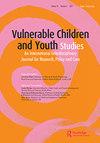Testing the psychometric quality of screening tools for the well-being of children and caregivers in alternative care-settings: a multi-informant study with families in Tanzania
IF 0.9
Q4 FAMILY STUDIES
引用次数: 0
Abstract
ABSTRACT Given the lack of validated screening tools for the well-being of children and caregivers in family-based care in low-income settings, the present study aimed to test the psychometric quality of two newly developed tools: Scorecard A as a screener for children’s emotional and behavioral problems and Scorecard B as a screener for caregivers’ well-being and resources. The study was conducted within the framework of an ongoing caregiver training program in Dar es Salaam, Tanzania, and included a sample of 124 caregivers and 99 children (57 girls, M age = 9.30, SD = 4.65, range 3–17) divided in three equally sized age groups of preschool (3 to 5 years), primary school (6 to 12 years) and secondary school age (13 to 17 years). Caregivers reported on children’s emotional and behavioral problems using Scorecard A and the Strengths and Difficulties Questionnaire (SDQ) administered as a structured interview. A sub-sample (n = 78) of caregivers participated in another structured interview on various aspects of their well-being and caregiving resources, based on which interviewers rated Scorecard B. Additionally, caregivers completed Scorecard B and measures of their well-being and resources administered as self-report questionnaires. All assessments were conducted twice with an interval of 1 week. Scorecard A showed good internal consistency and test-retest-reliability across age groups and significant associations with the SDQ total score and subscales indicate convergent validity, particularly among preschool-aged children. The internal consistency of Scorecard B was acceptable in the questionnaire and good in the interviewer rating, while re-test-reliability in both modes and inter-rater reliability between interviewer and caregiver rating were moderate. Associations with established measures of well-being and resources provided evidence for convergent validity of Scorecard B. The Scorecards hold promise as brief screening tools to identify children and caregivers with difficulties and evaluate intervention programs in low-resource contexts.测试替代护理环境中儿童和照顾者幸福感筛查工具的心理测量质量:一项针对坦桑尼亚家庭的多信息研究
本文章由计算机程序翻译,如有差异,请以英文原文为准。
求助全文
约1分钟内获得全文
求助全文
来源期刊

Vulnerable Children and Youth Studies
FAMILY STUDIES-
CiteScore
1.90
自引率
0.00%
发文量
33
期刊介绍:
Vulnerable Children and Youth Studies is an essential peer-reviewed journal analyzing psychological, sociological, health, gender, cultural, economic, and educational aspects of children and adolescents in developed and developing countries. This international publication forum provides a much-needed interdisciplinary focus on vulnerable children and youth at risk, specifically in relation to health and welfare issues, such as mental health, illness (including HIV/AIDS), disability, abuse, neglect, institutionalization, poverty, orphanhood, exploitation, war, famine, and disaster.
 求助内容:
求助内容: 应助结果提醒方式:
应助结果提醒方式:


